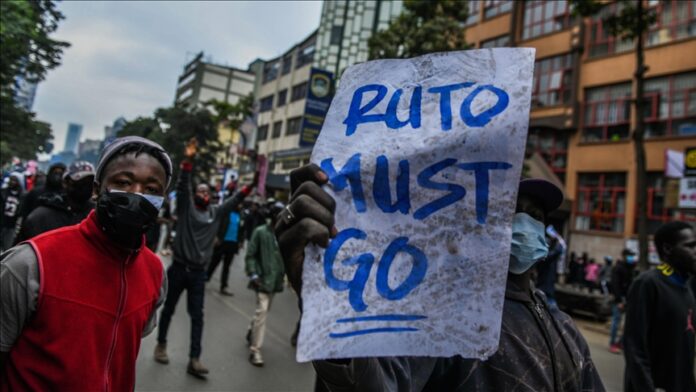
A seed of doubt that was planted long time ago in many methods has sprouted into a seedling called dissent among young people. The country is in chaos in the backdrop of a growing debt crisis, fueled by chronic profligacy among the ruling class. While a youth nation cried for jobs, their parents for better pay, the head of state and his inner circle swam in insolent opulence. They forgot the teachings of God on humility, the same God whose name they repeatedly called at the acme of campaigns, and decided to reign terror on young people. A number abducted, a number murdered in cold-blood! Their mistake? A call for austerity.
Woe unto ye who ignobly refuse to find the treasures of history, because, if you did, you’d understand the lushness at the Versailles Palace, the obstinance of King Louis XVI and the extravagance of Queen Marie Antoinette in the days running up to the 1789 revolution in France . The truth is; in every sense of the word, Kenya is on the verge of becoming a failed state and the least we can do, is to save it from plunging into unprecedented chaos. However, the elephant in the room is whether there is a political or general goodwill to do so.
Wile the souls of the populace wailed and wept for the nation, a section of the fifth estate and the a majority of the wielders of the instruments of power denigrated their plights, accentuating the sharp divisions in the country’s political landscape. The constitution of Kenya, under article 37 protects peaceful protesters and grants them the right to democratically and freely air their opinions, whether pro or con the government of the day. Law enforcement agencies therefore, in the logic of this sacrosanct provision of the supreme governing document in Kenya should maintain order during such moments by protecting demonstrators, unless they turn violent or pose a threat to national security.
It is in this light therefore that anyone who understands, comprehensively the precincts of article 37 would be discombobulated by the dumbfounded deaths of Rex Kanyike Masai, among some other over twenty Kenyans, in the wake of the uncharacteristically peaceful Gen Z orchestrated anti- finance bill demonstrations in the latter days of June. It all began with X hash-tags, that matured into a full-blown ‘revolution’, a justified sobriquet, given it’s impact to the trajectory of policy building and decision making processes in the country.
“25th June 2024 has secured a place in the history of Kenya,” a post from BBC journalist Waihiga Mwaura reads and justifiably so, that day goes down in history as the first and only day that civilians ever breached Parliament buildings and took a way the mace, which is the symbol of royal authority, seldom which no bill can be passed into law through the National Assembly. In the aftermath, a lonely President William Ruto issued the shortest ever statement by a head of state in time of crisis, in which he erroneously referred to the events of the day as treasonous acts. Let us face it, taking the mace was a disrespect of sorts to the house of legislation, but nothing that happened that day amounts to treason.
The parliament has a public gallery meant to accommodate citizens during proceedings, which makes their presence there regular, seldom the fact that it was a forceful entrance. Additionally, no Parliamentarian was attacked by any demonstrator, who in the first place protected and aided the escape of a disabled MP from the chaotic circumstances.
This underscores the general idea behind the pickets. It had an objective foundation. With neither a planner nor a leader nor ethnic boundaries, the young generation passed a colossal message, not only to Kenyan leaders but the world at large, that the time had come to break the traditional barriers to progress in the country, such as ethnic backgrounds, difference in political ideologies, and shortage of critical voices.
Police brutality was put under the spotlight as unarmed youths were unlawfully dispersed by teargas cannisters and to an extreme extent, live bullets were used, people died and a good number, including some journalists injured, with nobody from the ranks of security apparatus coming out to take responsibility for the brutal actions on those they are supposed to protect in times of chaos.
This come has further stirred a feeling of betrayal among the people, with president Ruto having vowed to end police brutality and extrajudicial killings by law enforcement agencies. This was exacerbated by his insistence to heap praises on the cops, who according to him conducted themselves with utmost professionalism.
First things first, some of the officers, especially those who dropped protesters by live bullets were in plain clothes and balaclavas. At some point, it was alleged that there were snipers , who even shot at police officers. To what ends though is the elephant in the room. Why would a state hire a sniper on its own people and worse till, law enforcement bodies? What do those who hired them stand to gain if unarmed people die and what do they stand to gain in the case a police officer dies?
When and how did we get here? A throw back ten years ago and Kenya is the most peaceful and stable country in Africa. This is a reality check for the political class to revisit their readiness to be held accountable and their capacity to take responsibility for their actions. However, a major challenge is that the typical Kenyan traditionally assumes that a bunch of notes and flashy promises are sufficient to pacify a Kenyan soul, and so they remain unbothered with their plight but instead find ways to make it a fault of the citizens when they demand for what they promise during campaigns.
Under normal circumstances, if the rule of law is observed to the letter, the first action in the aftermath of the protests would’ve been to investigate, extensively the officers who massively brutalized citizens. However, what we have witnessed from those in situ in the government is that they have eerily heaped praises on them, regardless of the fact that they not only violated the laws but also created a bad reputation for themselves. No well meaning administration would fail to put to task a rogue security agency and no well meaning officer would go to a peaceful protest with a balaclava and in plain clothes.
If what they are doing is right by the constitution, then why not just put on police uniform and show their faces? Why hide the registration number of their vehicles from the public? They have put our country’s foundations of human rights on a quicksand, at a time when a sense of patriotic consciousness has sprouted among the youth bulge in the country, that not all the time our ethnic barriers matter, especially on issues of civic engagements.
The nadir of the situation is the fact that politicians continue to play politics by giving out conflicting figures on what they perceive to be the actual number of casualties, deaths and extent of looted property. In his first address, Mr. Ruto, the president of the land claimed that six people had died, followed up by nineteen people then the Minister for Interior Mr. Kindiki said the figure stood at twenty five as of fourth July while oversight bodies among them Amnesty International, Human Rights Watch and media houses have put the figure at 41, with additional 361 injuries, 627 arrests and 32 forced abductions.
Why can’t the government come clean on the actual figure, or at least give consistent statistics?. Funnily, in the backdrop of the confusion, the government has prioritized managing optics and perspectives rather than taking the bull by it’s horns. The talk of town is that the pickets were infiltrated by malicious criminals, who decided to loot public and private businesses. Lives have been lost, but the leaders prefer to gloat over money and property than the people who in the first place put them in their respective offices via the proverbial popular vote.
This exposes a government that values it’s face and the interests of those in the ruling class at the expense of the masses. Pertinent issues of governance were raised, but the focus has largely been on the criminalization of the demonstrations with minimal attention to addressing the elephant in the room. Even though Mr. Ruto hosted a space in an attempt to appease Kenyans, it remains to be seen whether he will build his government around the wishes of the public or just go out on a limb to lead and to impose high taxes and create unlawful offices and resource kitties. The economy is unstable and the country’s debt crisis has put every sector on a cliff, but does the goodwill to manage it, amicably from those who wield the instruments exist?










